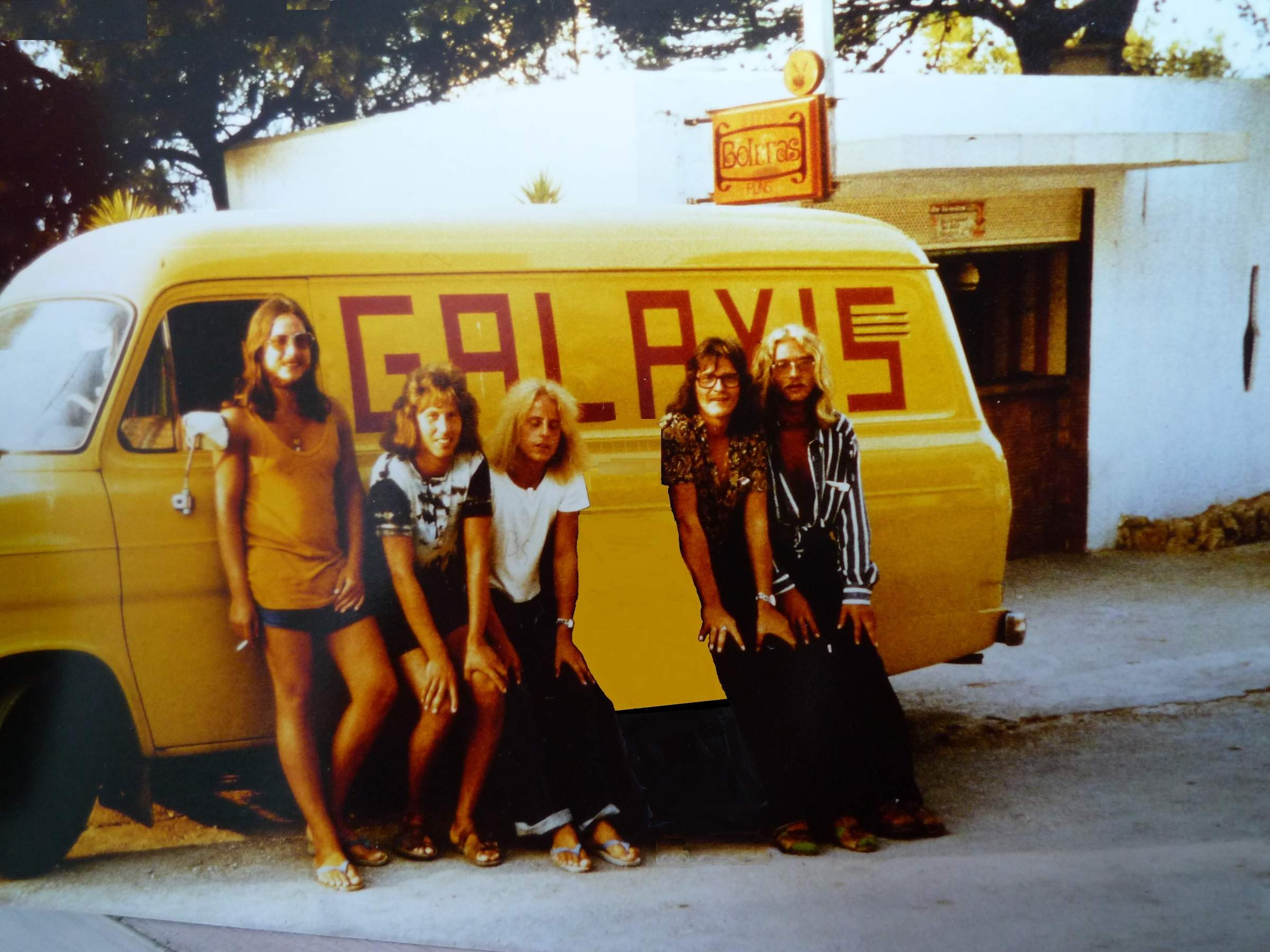Galaxis | Interview | Resurfaced from the Underground
Galaxis, a hidden gem in the German heavy rock scene, dropped a killer single in 1974, and this summer, Ancient Grease Records is bringing it back with a high-voltage reissue.
The release featuring ‘Someone Needs Your Love’ and ‘True Experience’ is a stunning find from the heavy German band Galaxis. Originating in Duisburg, the band formed in 1971 with Wolfgang Chilla on vocals, Claus de Crau on guitar, Wolfgang Richter on bass, Edgar Geffroy on drums, Holger Kampmann as roadie, and Ewald Phillips as manager and sound technician. This close-knit group quickly became a dominant force in the regional rock scene. These two songs, heavily influenced by the thunderous sounds of bands like Uriah Heep, Black Sabbath, and Deep Purple, captured the essence of heavy rock at the time.
Galaxis’s reputation grew as they played alongside big names like Eloy, Scorpions, and UFO. A particularly memorable event was their open-air gig with UFO, followed by a tour in Majorca, both of which solidified their position in the German rock scene. However, despite their success, Galaxis disbanded in early 1975, leaving behind only a limited run of their single, which was quickly snapped up by collectors and fans.
Ancient Grease Records has not only remastered this rare 7-inch single, but they also plan to release a full-length LP in 2024. Remarkably, it’s been discovered that Galaxis had more music tucked away for decades. This came to light when Baron Marshall, a friend of the label, was in touch with Micki Richter, son of Wolfgang Richter. Micki revealed that Galaxis had unreleased tracks, leading to an exciting new project to bring these lost recordings to life.
The band’s former manager and sound technician, Ewald Phillips, played a crucial role in preserving these recordings, along with a treasure trove of band photos and memorabilia. This collaborative effort, fueled by the passion and dedication of people like Baron, Micki, Ewald, andAdam Bennati, has breathed new life into Galaxis’s legacy.
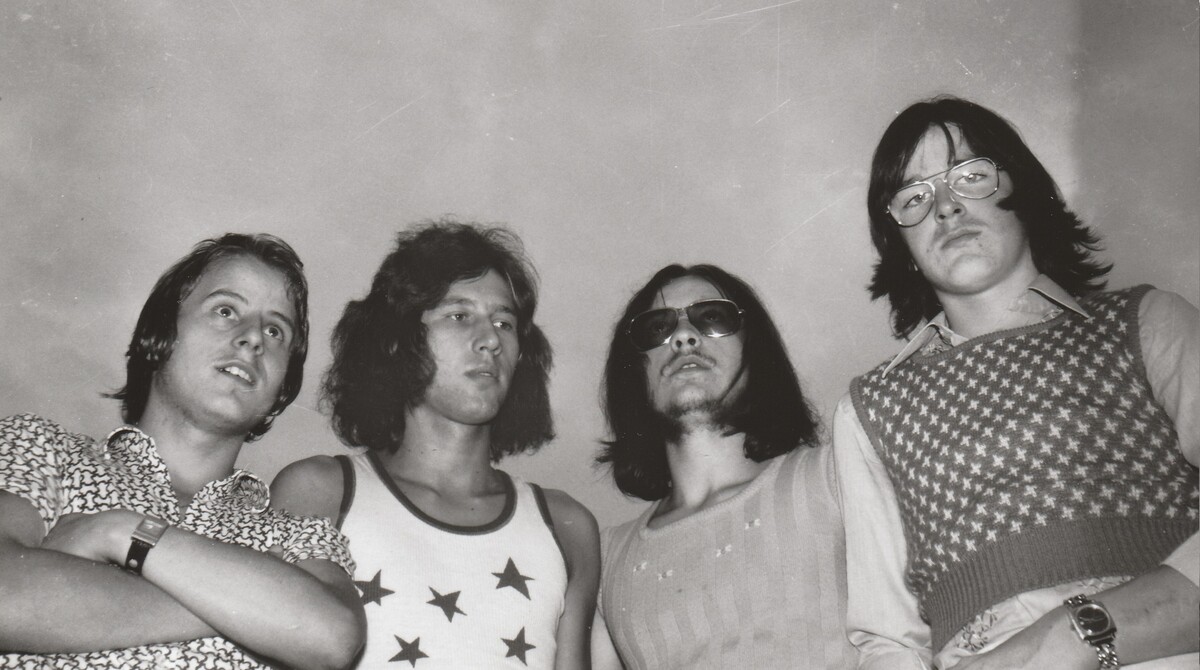
“We were mainly inspired by Uriah Heep, Black Sabbath, and Deep Purple”
It’s great to have you. It must be exciting to be working on a reissue after so many years. How do you feel talking about Galaxis so many years after the release?
All five band members of Galaxis: It is an incredible coincidence and joy that decades-ago events that we thought were already over are catching up with us again. This is going to be a very exciting time waiting for what may still be in store for us. In any case, it will ensure that the Galaxis group does not disappear into the nirvana of history because the new publications can now also be recorded in the German Federal Archives and can still be experienced there by the people who come many generations after us. We feel very lucky and honored that we can still experience this together and that we are getting closer again. It’s worth more than winning the lottery!
Ancient Grease Records is always taking care to present the best possible product. Can you tell us about the material they will issue?
We hope that the recording of the 7″ record will be thoroughly processed in better quality in the studio and will be re-pressed as a record with a new design. We have made the other songs on our private tapes available to Adam Bennati from the label, and it would make us really happy if this material could also be used for an album production.
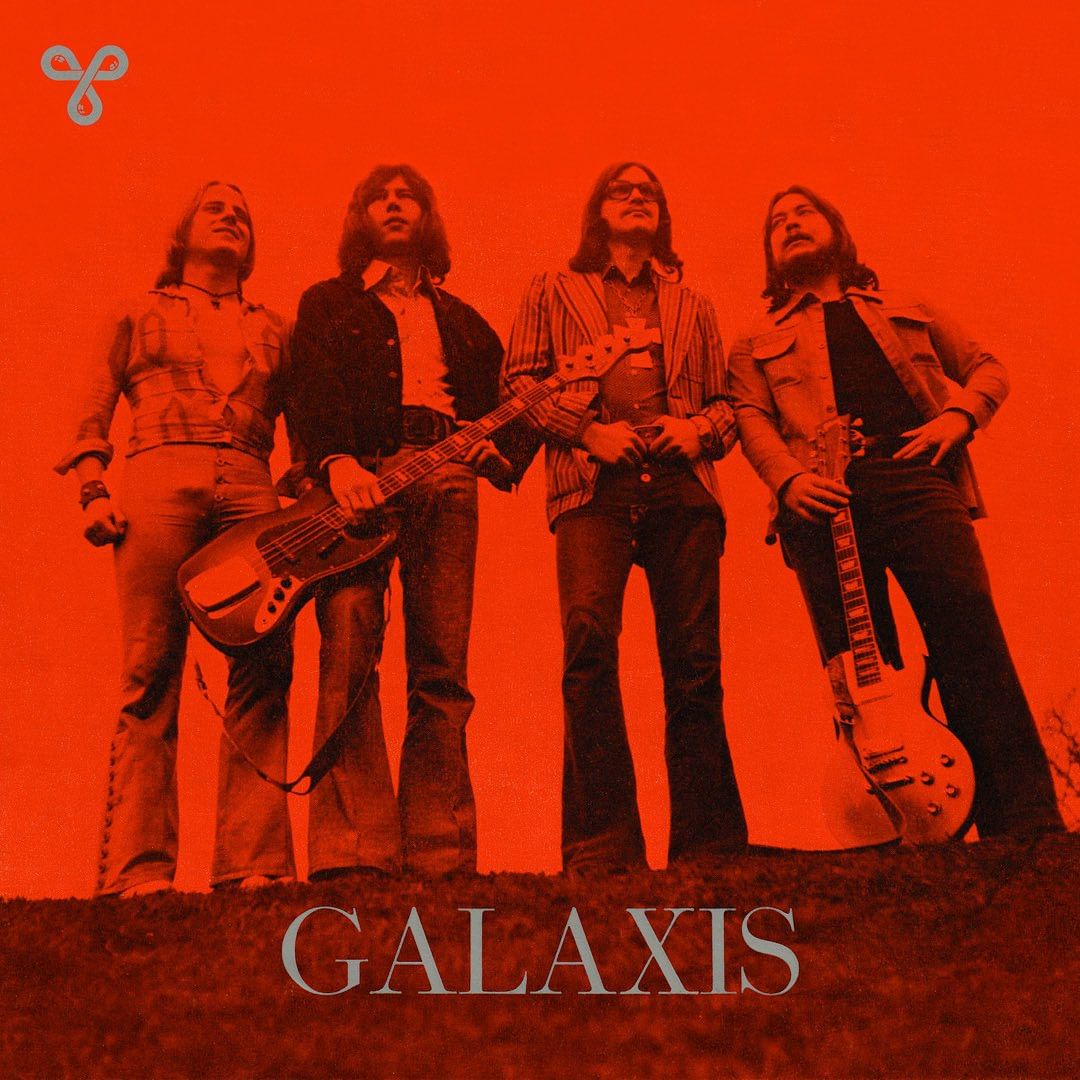
Would you like to talk about your upbringing? Where did you grow up and what was that like for you? What was life like in post-WWII Germany?
Like most people in Germany after the war, we grew up in simple working-class families. Childhood was still marked by the hardships caused by the consequences of World War II. This has made us all very down-to-earth people.
How did you first get interested in music, and what would you say were some of the early influences that got you interested in music?
As far as this question is concerned, each one of us has found his own way to music and the motivation to want to become active in this area. For example, during one of his first visits to the local “Chattanooga Nightclub,” Claus attended a live band concert and was determined to play such great music on stage too.
When did the decision to start the band come about?
That was in 1971. Claus made music with three other friends in the basement of the youth club in Meiderich, a district of Duisburg. They called themselves “Emergent Sound.” When the lead singer devoted himself to other interests, Wolfgang Chilla, who lived near the youth club and was a regular visitor, came along and began to sing with the band. When the bass guitarist left the band to switch to dance music, he recommended Wolfgang Richter, a colleague and guitarist, as his successor. The band agreed, and Wolfgang was happy to mainly play bass guitar.
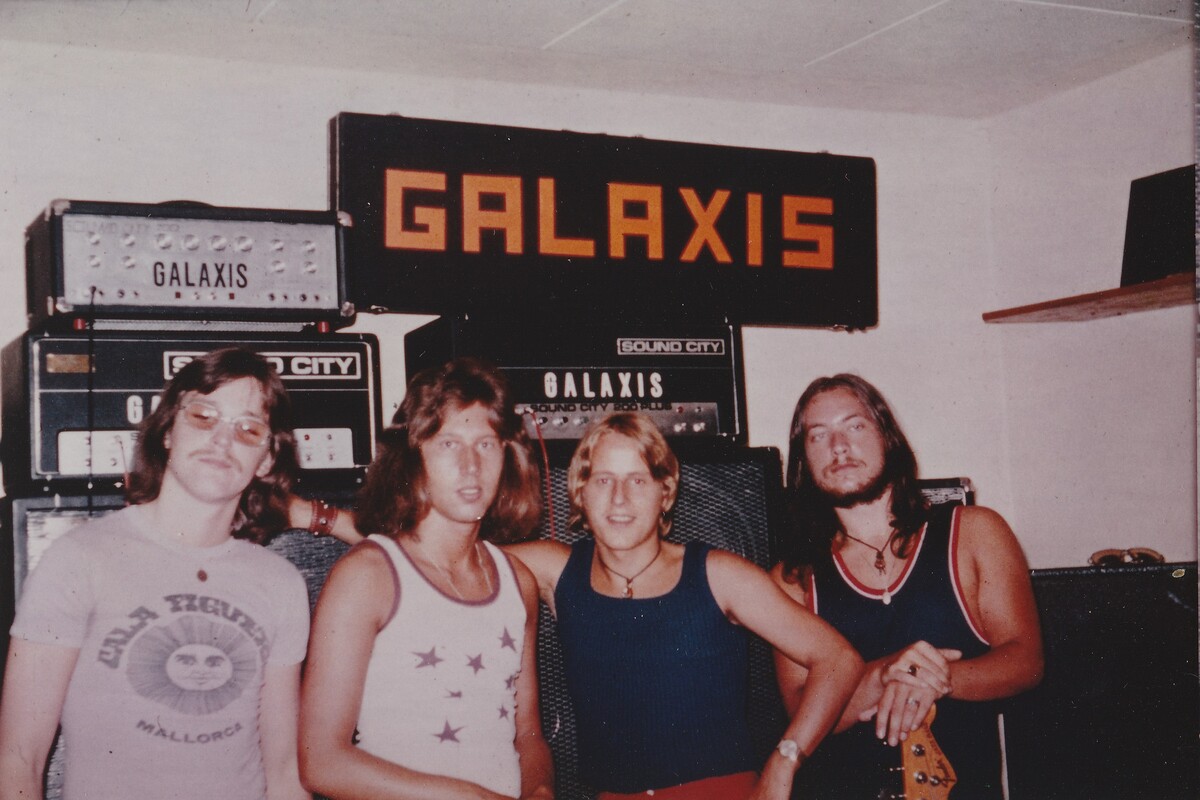
Were you familiar with some of the early German bands like Tangerine Dream, Cluster, CAN, Amon Düül II?
Yes, of course! We thought it was great that there were German bands that attracted international attention. It was our goal to also gain such popularity one day.
What was the scene like in your town of Duisburg? Were there any other similar bands around that you shared stages with?
Besides us, there were also the bands Bröselmaschine with Peter Bursch, Alma Ata (the original line-up is still largely active today), Black March, Glatter Wahnsinn, Linn, and Bernstein. We have shared the stage with most of them at local music festivals and beyond. I [Ewald Phillips] was active with Linn and Bernstein for a while after the Galaxis period, until I finally ended my band career with the Bernstein group and concentrated entirely on my further education and professional career.
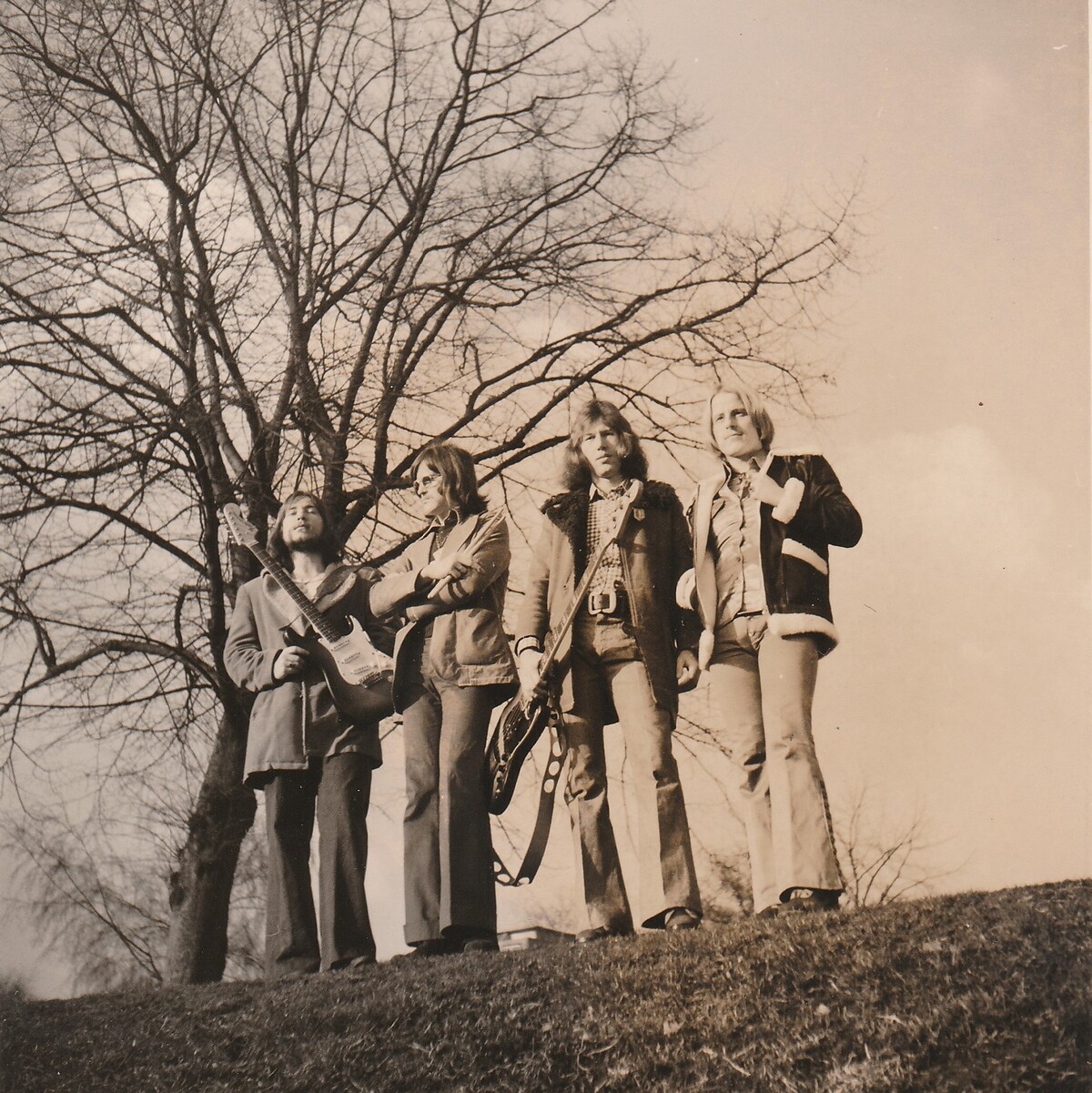
Did you have a certain hanging out place where “freaks” could meet and listen to music, etc.?
At that time, there were still a few local discotheques in Meiderich. Progressive music was played in “Blow Up” (the successor to the “Chattanooga Nightclub”), which was the highlight in Duisburg, and in four other discotheques: “Tabaris,” “The Sealord,” “Die Raubritterburg,” and “Die Palette,” which we hardly ever visited. The core meeting place for us was the municipal youth club in the city park, where our rehearsal room was located and where not only disco evenings were held but also live bands played. We had many live performances there too.
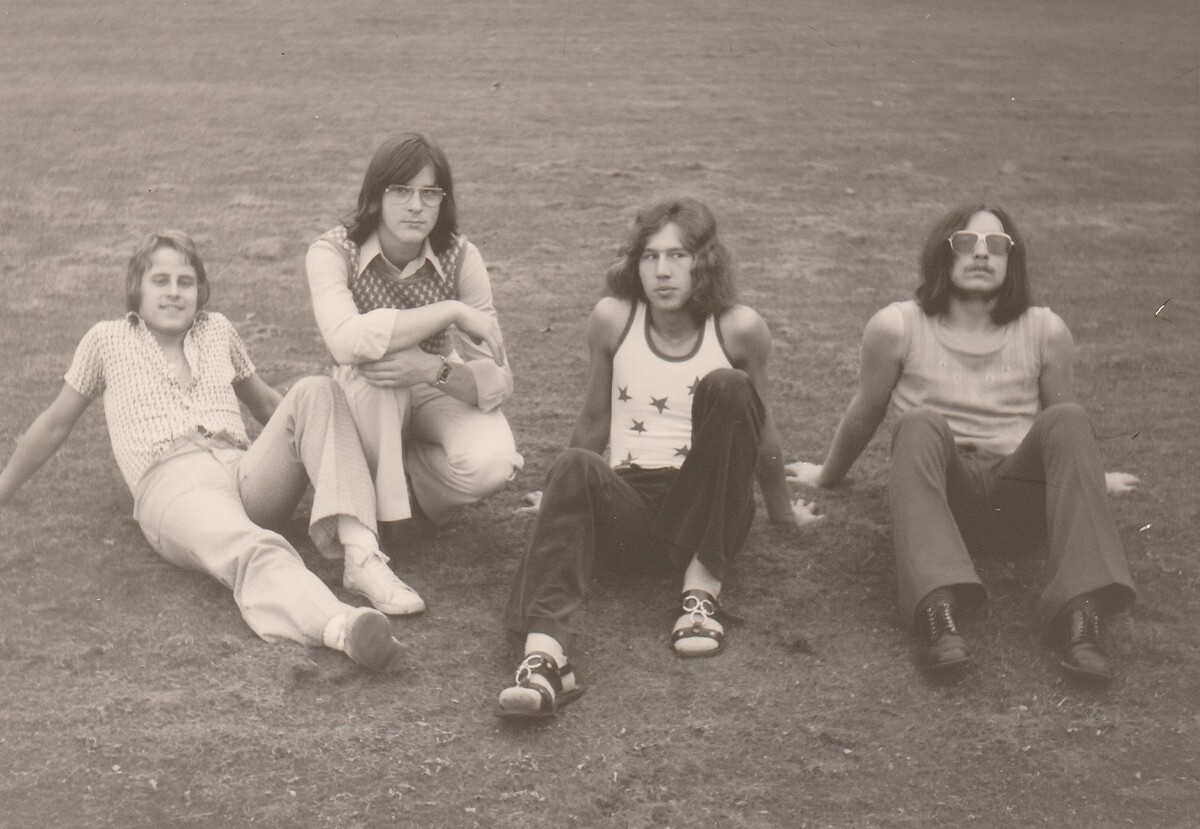
When was Galaxis officially born? Please elaborate on the formation of the band and how you first met.
As already mentioned, that was in 1971. After the new formation had had time to settle in, the band wanted to change the old band name to mark the new beginning. Claus still remembered his first visit to a concert at the “Chattanooga Nightclub,” and because that music was “out of this world” and had transported him to other spheres, the name “Galaxis” sprang to his mind. We discussed whether we should use the German spelling or the English version (Galaxy). The guys agreed on the former since it was distinguishable from the internationally very common and frequently used English version.
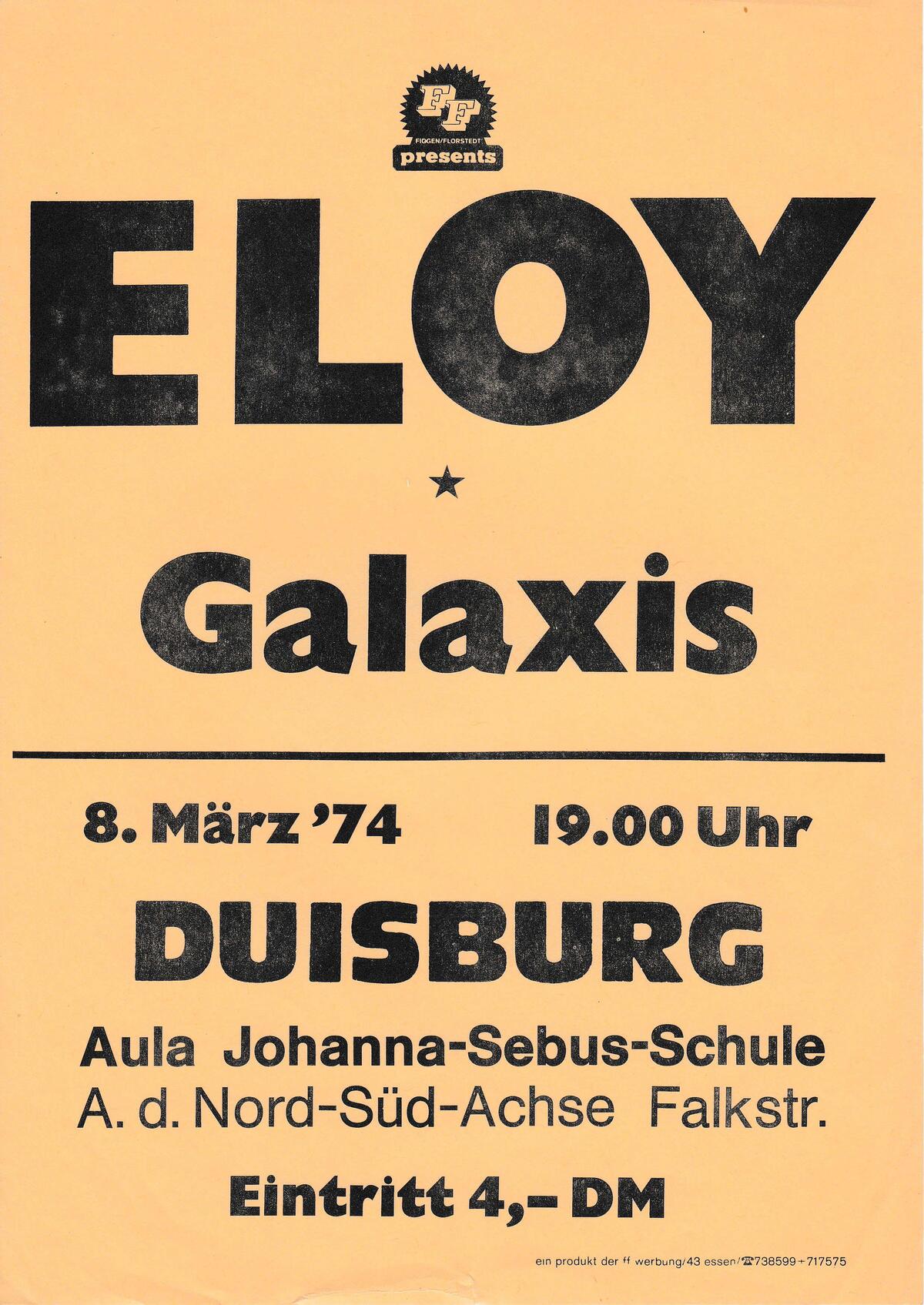
What did your repertoire consist of early on? Did you play a lot of shows? What are some bands you shared stages with?
Our genre was mostly hard rock with the majority being original compositions. A few tracks were covers by other bands, including Black Sabbath and Uriah Heep’s ‘Lady in Black’ and ‘The Park’. We had joint concerts with Eloy, also a well-known German band from the Krautrock era, as well as with the Scorpions, who at that time were still on the verge of becoming world-famous, and UFO, with whom we played at the MSV Duisburg football stadium in Meiderich shortly before our departure for the Majorca tour. We had a gig about every three to four months. After the release of our single, we were able to secure more gigs than before.
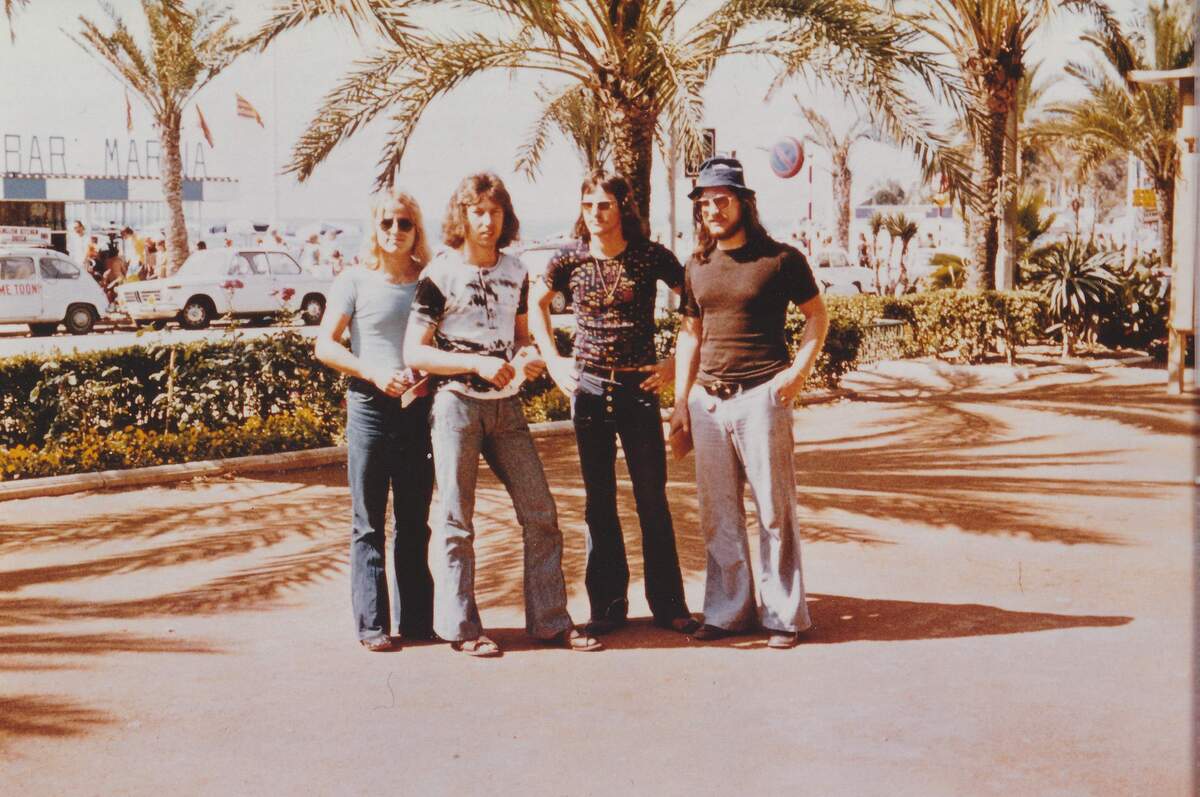
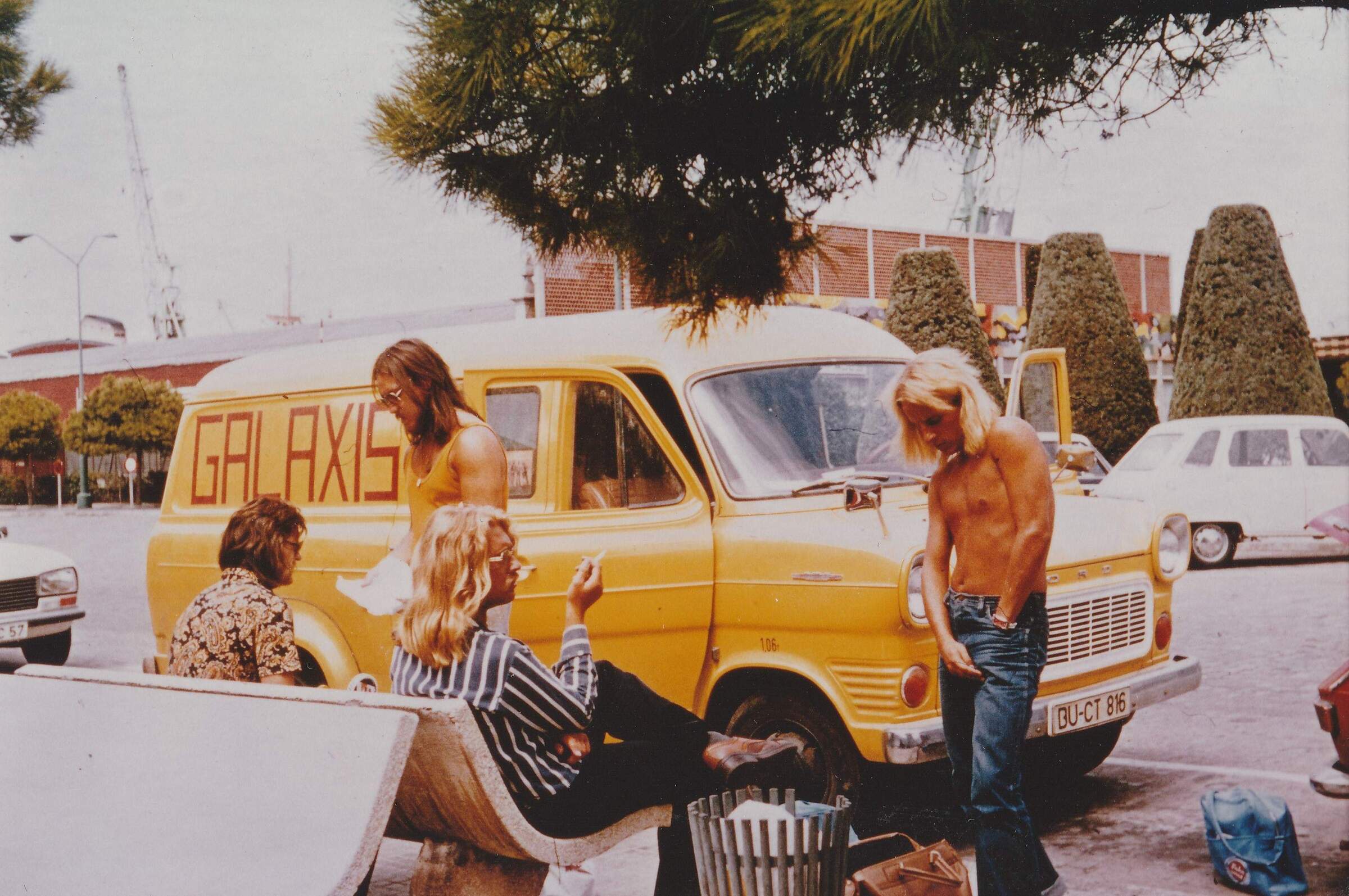
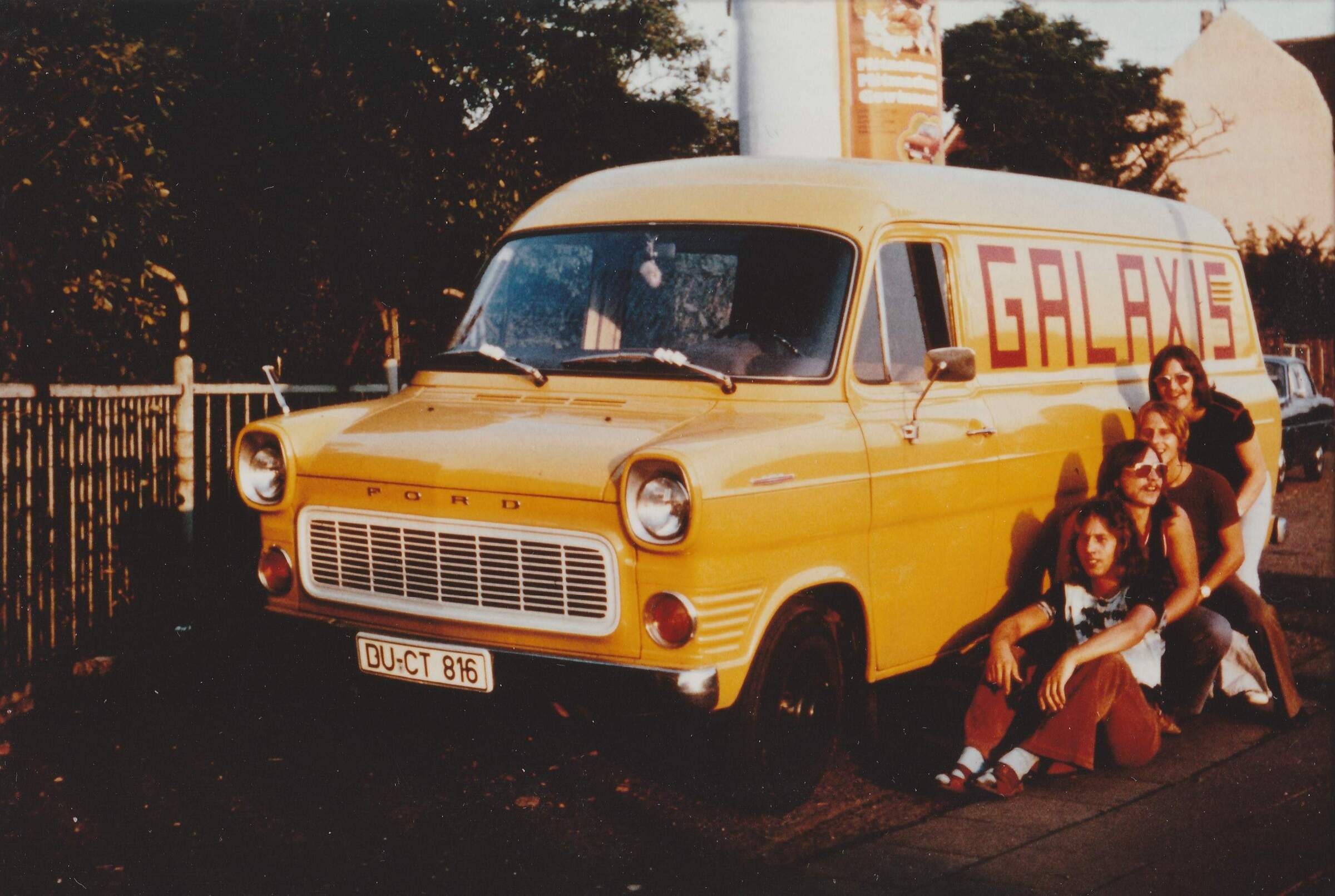
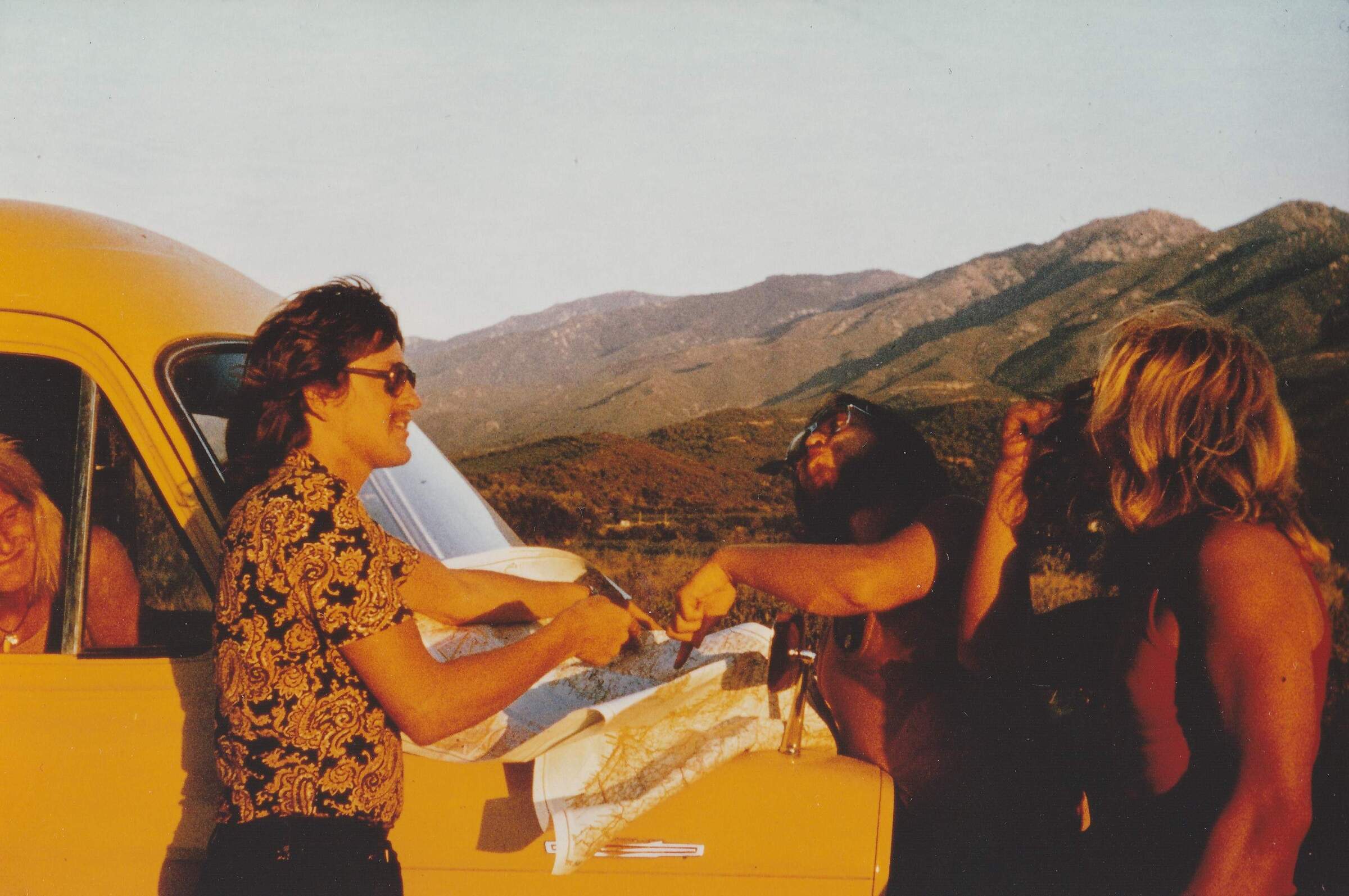
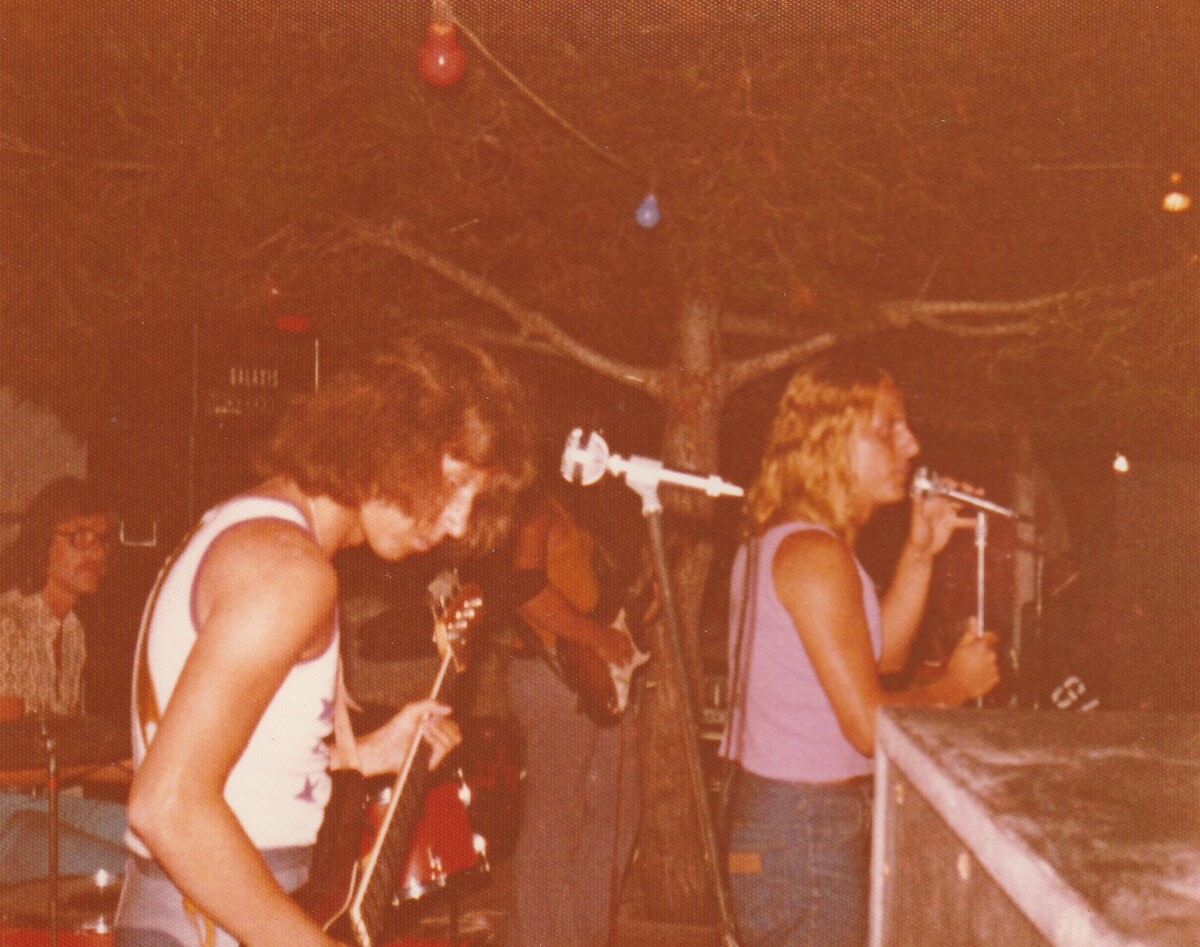
Tell us about your instruments and amplifiers and other gear you had in the band?
The equipment initially consisted of a Sound City amplifier with Winston or a Sound City double-box tower for bass guitar and guitar. Two high speakers from Winston with amplifiers were used for vocals. Later, a Marshall double-box system and new PA bass reflex boxes with separate tweeter beam boxes were added for bass guitar and guitar. The instrumental ensemble consisted of Fender Jazz Bass and Stratocaster, as well as Sennheiser microphones with hemispherical characteristics. Later, the Gibson Les Paul de Luxe guitar was added, which was also used on the single recording.
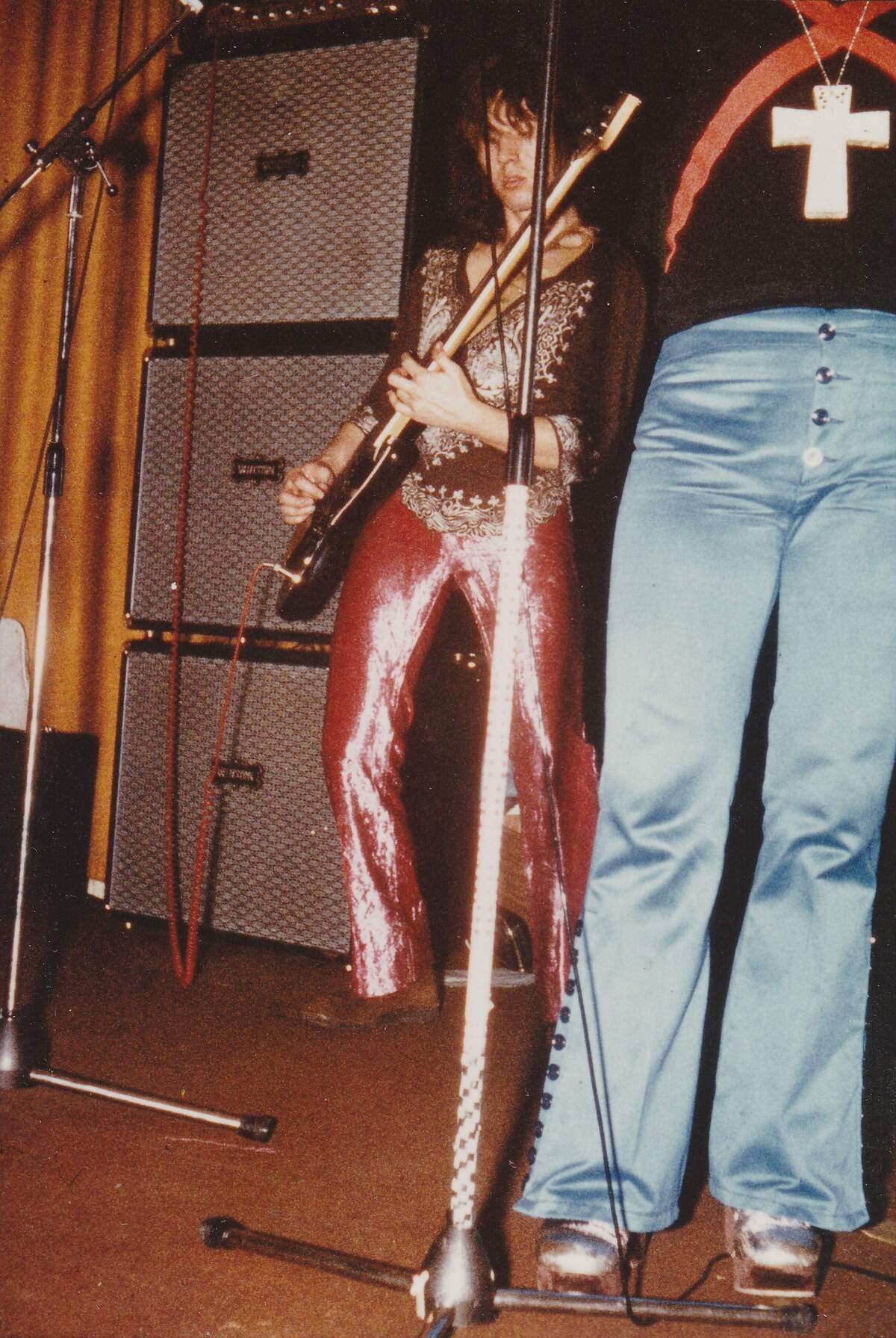
Were you signed to any booking agency?
No, Ewald—at that time still under the nickname “Zambo Robinson”—was responsible for that, because we wanted to remain independent and flexible despite all our motivation. Some of us were still in vocational training. In addition, we were not willing to reduce our fees by having to share with agents.
“We produced the single ourselves”
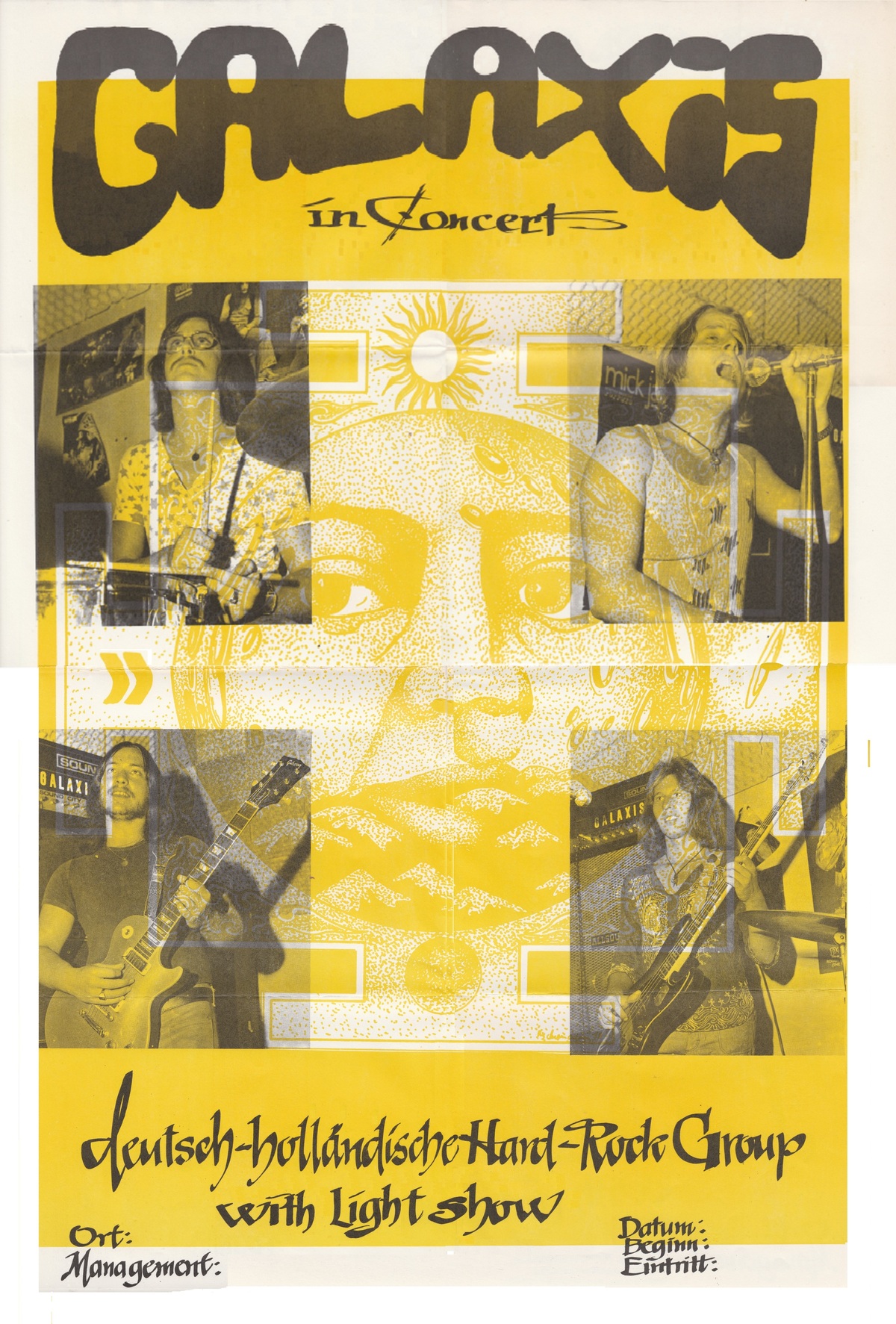
What’s the story behind the single ‘Someone Needs Your Love / True Experience’? Where did you record it? What kind of equipment did you use, and who was the producer? How many hours did you spend in the studio?
We were planning a tour of Majorca in the summer of 1974 and wanted to take something with us that our fans could buy as a souvenir from us. We produced the single ‘Someone Needs Your Love / True Experience’ ourselves. The studio we went to was in Cologne (Studio am Dom). The recording and mixing were done on a Saturday in about 12 hours. The record pressing was commissioned by the recording studio. Looking back, we would do it better today!
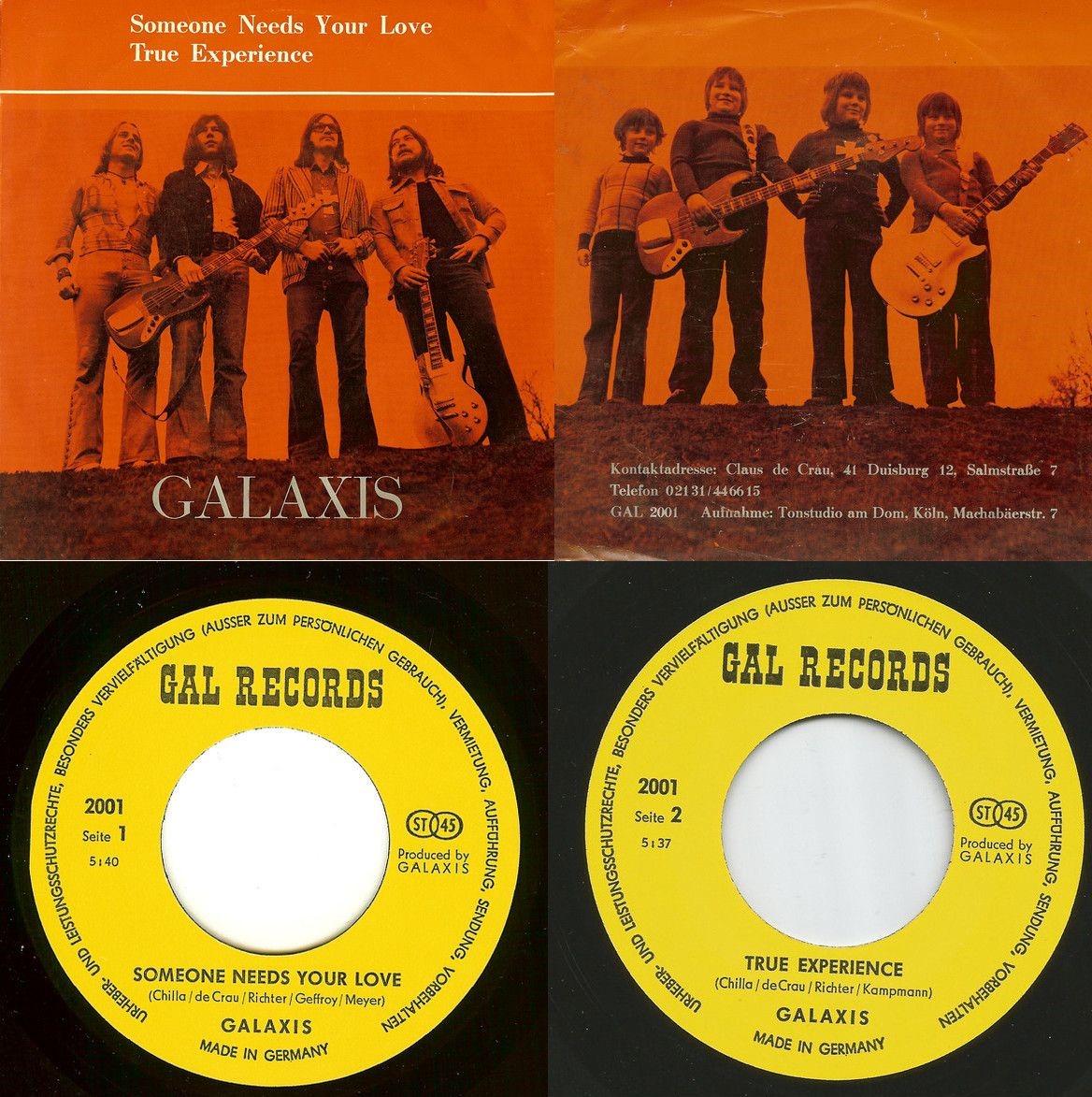
What about the rest of the unreleased material that we will be able to hear soon? Where was that recorded?
In addition to the single, there are also tape recordings from our rehearsal room using our own private and, unfortunately, simple—then commercially available—tape recorders. Ewald’s recordings were made with a Telefunken device with 2-track recording in both playback directions. For cost reasons, however, the tracks were only recorded as mono recordings.
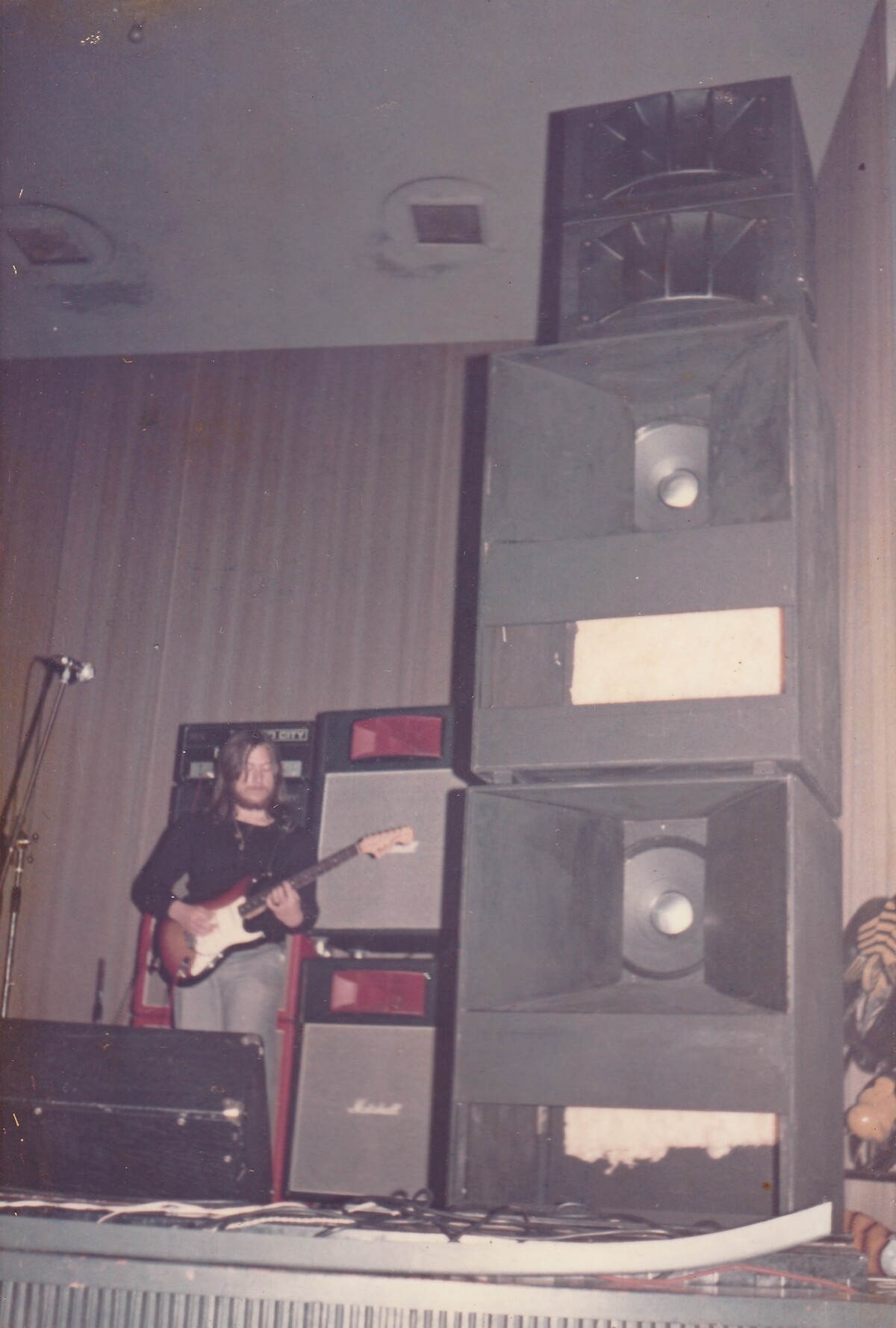
Please share your recollections of the sessions. What were the influences and inspirations for the songs recorded?
At the beginning, we rehearsed every Wednesday and Friday at the youth club in very good basement rooms. In 1972, we moved into a rehearsal room rented on the premises of a canoe club in Duisburg-Laar, which we insulated acoustically with sound-insulating materials. We were mainly inspired by Uriah Heep, Black Sabbath, and Deep Purple.
Would you share your insight on the tracks?
As is often the case with young people, the themes we wanted to express through music were love, war, and freedom.
What was the songwriting process like for the band? What inspired songs?
Claus usually gave the impetus for new pieces by playing a few guitar riffs that summarized the positive aspects of pieces he knew. Gradually, the other guys made suggestions for the respective parts or instruments, and so the originally suggested notes developed into a coherent song.
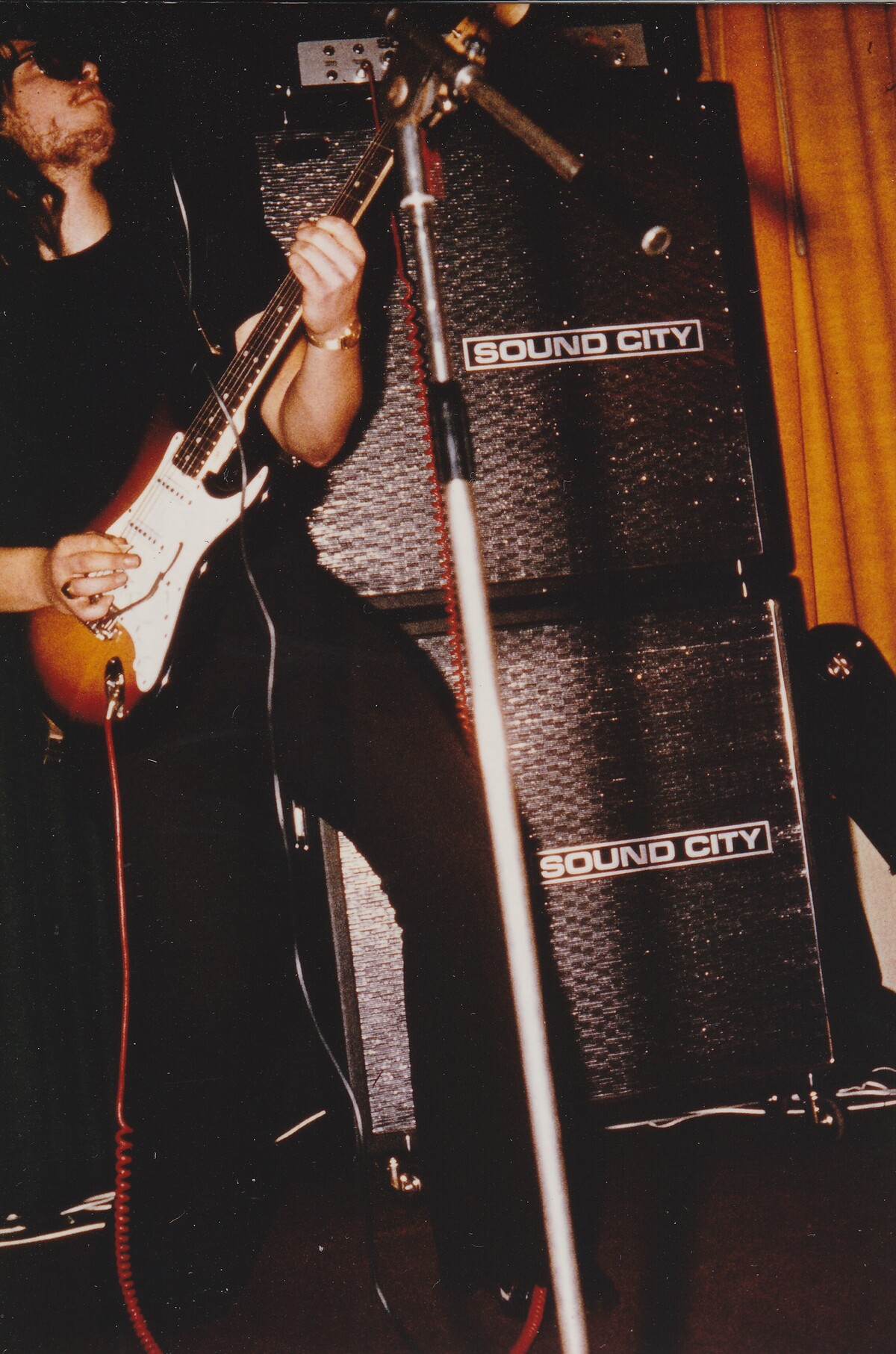
“The record was mainly intended as a souvenir for tourists in Majorca”
How pleased was the band with the sound? What, if anything, would you like to have been different from the finished product?
When we held the finished product of the single in our hands and then played it, we were disappointed—no, stunned—by what we heard. Unlike the recording on the master tape, which was recorded and mixed really well, the vocals on the record were way too much in the background. The instruments could also no longer be heard very transparently. The studio operator must have commissioned a very below-average record pressing plant to probably maximize his profits. But we simply didn’t have enough experience, money, or time to take legal action. Since the record was mainly intended as a souvenir for tourists in Majorca, we left it at that. We are still hoping that the master tape will turn up after all.
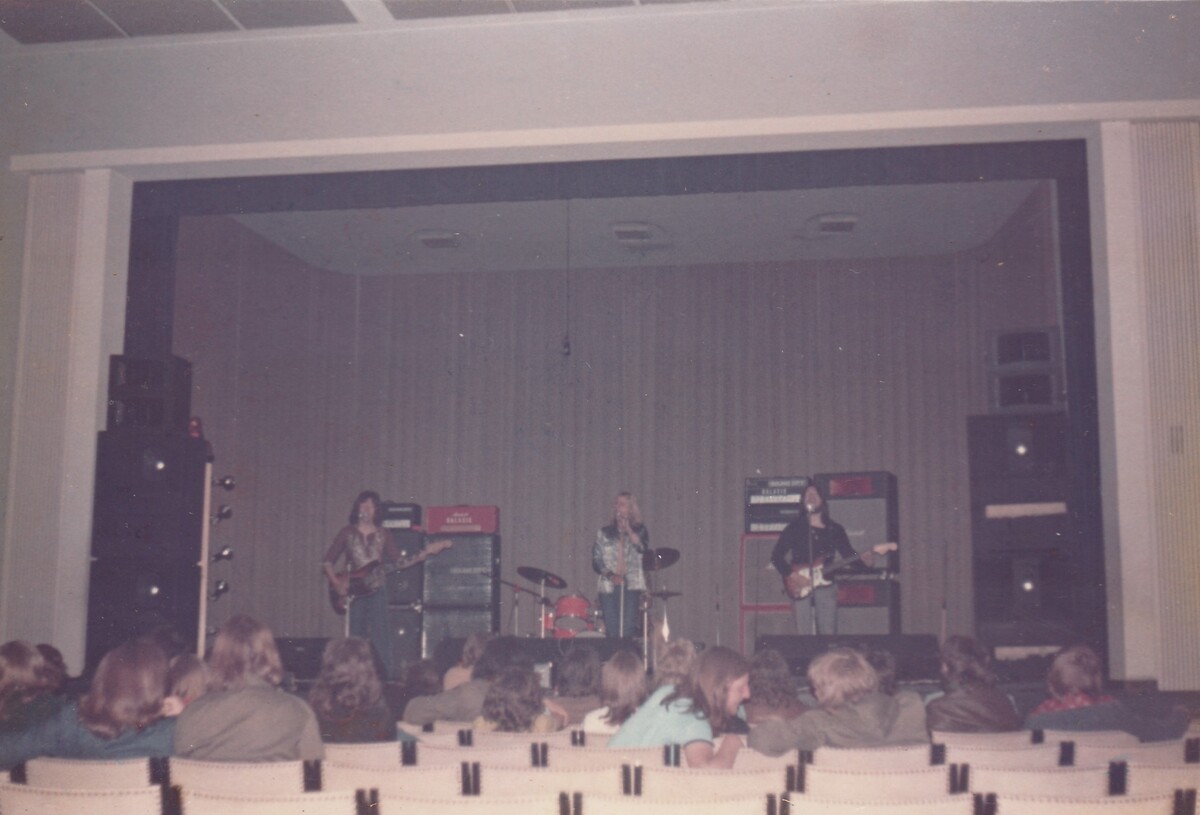
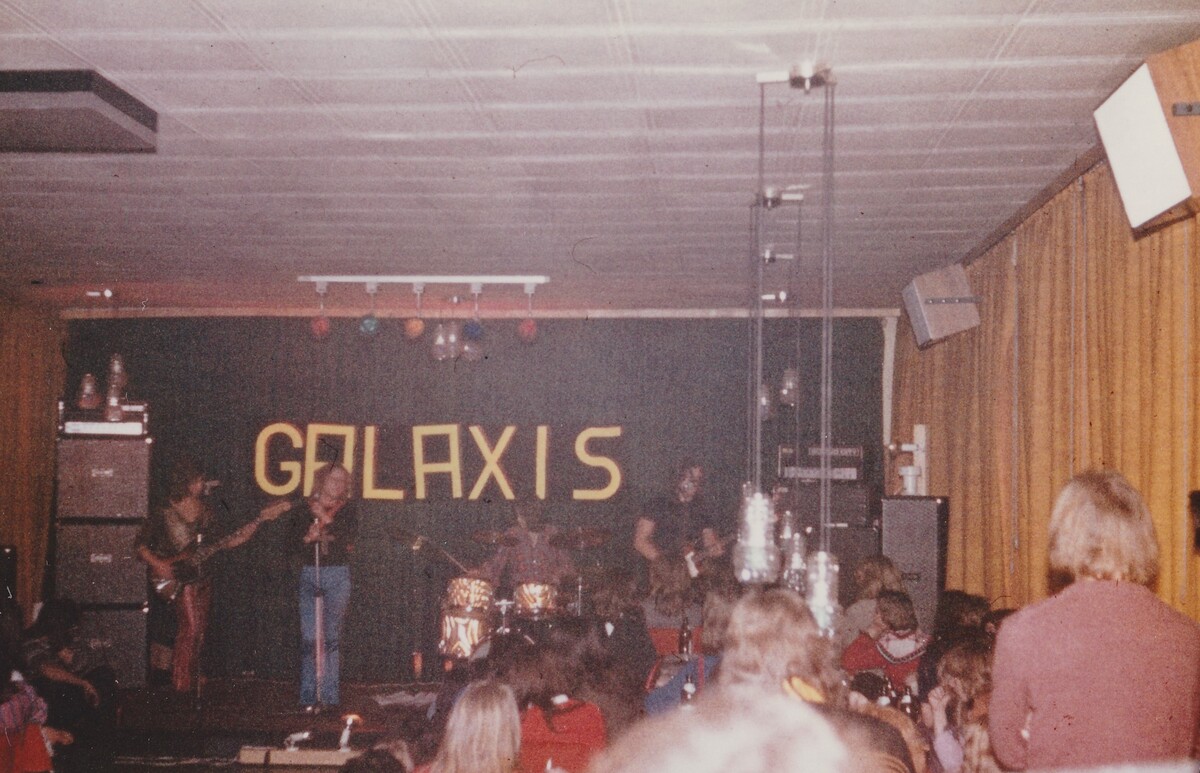
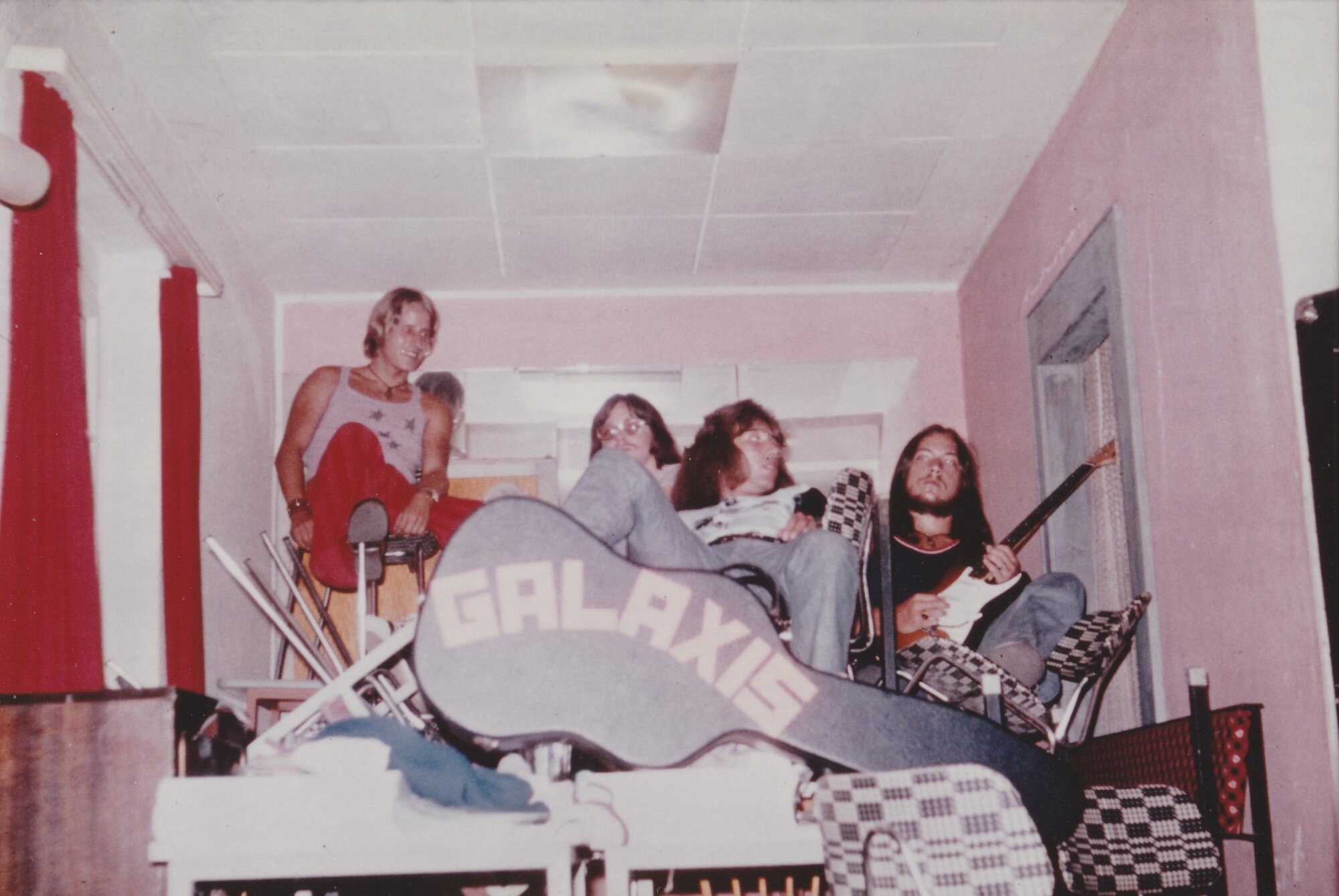
The single was privately released under the name of Gal Records. How many copies were pressed?
There was only one edition with 500 pressings. Most of these have found buyers.
How did you distribute the records? Via local stores or at gigs? Did you send some to the stations and labels?
Most records were sold at our concerts. There was also a record shop in Duisburg called “Die Schallplatte”—incidentally the oldest (since 1954) in Germany and still in existence—that sold our record.
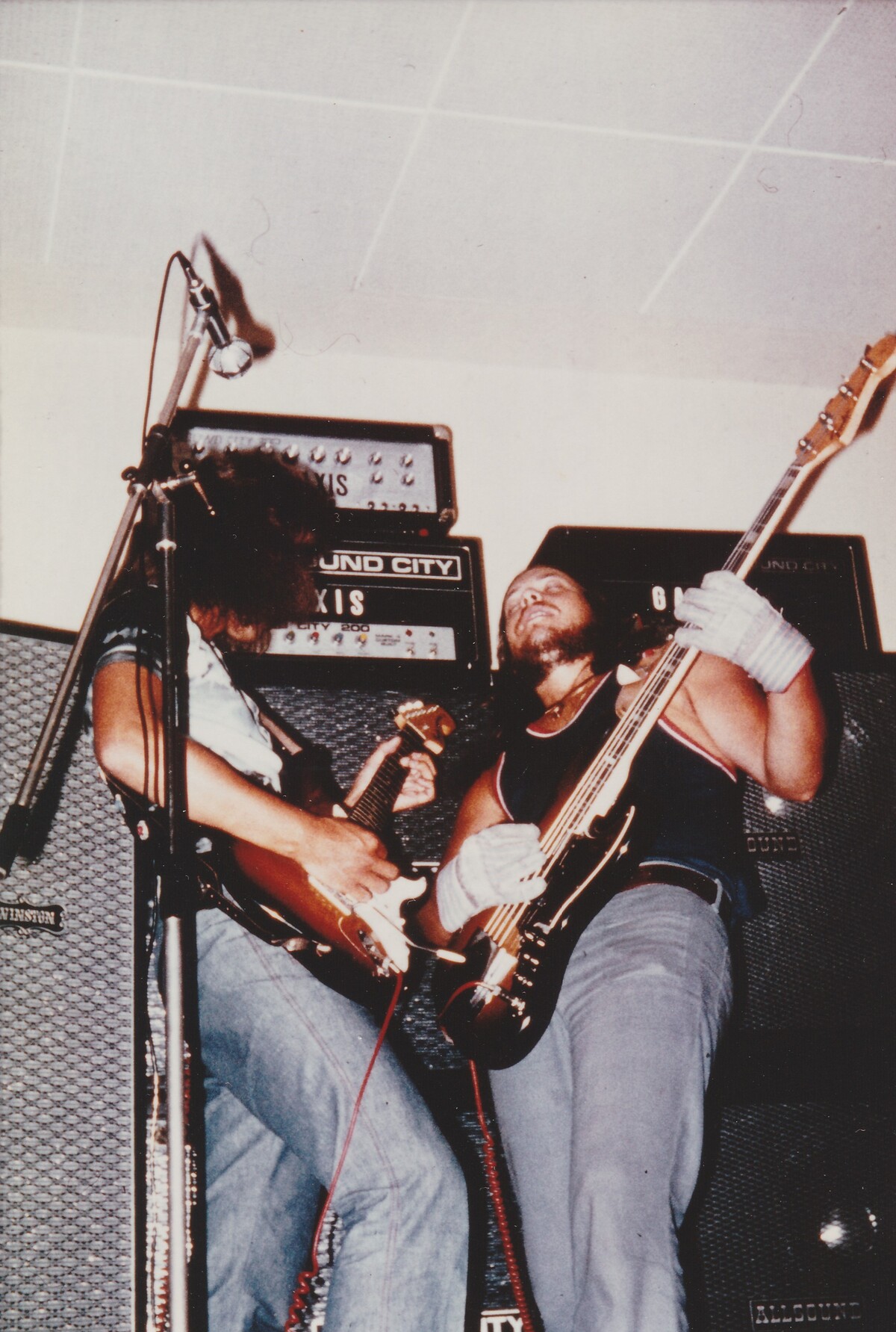
What’s the story behind the cover artwork? How did you choose the name of the band?
We wanted to visualize opposites of today and in the past, or the now and what is to come.
Were you inspired by psychoactive substances like LSD at the time?
Drugs never played a role for us. We were content with “sex, alcohol, and rock ‘n’ roll”!
What followed for the band after the 7″ was out?
As mentioned, the record was planned for the Majorca tour, and we wanted to see what came of it. Naturally, we thought we would be able to increase the chances of performing with a record as a reference.
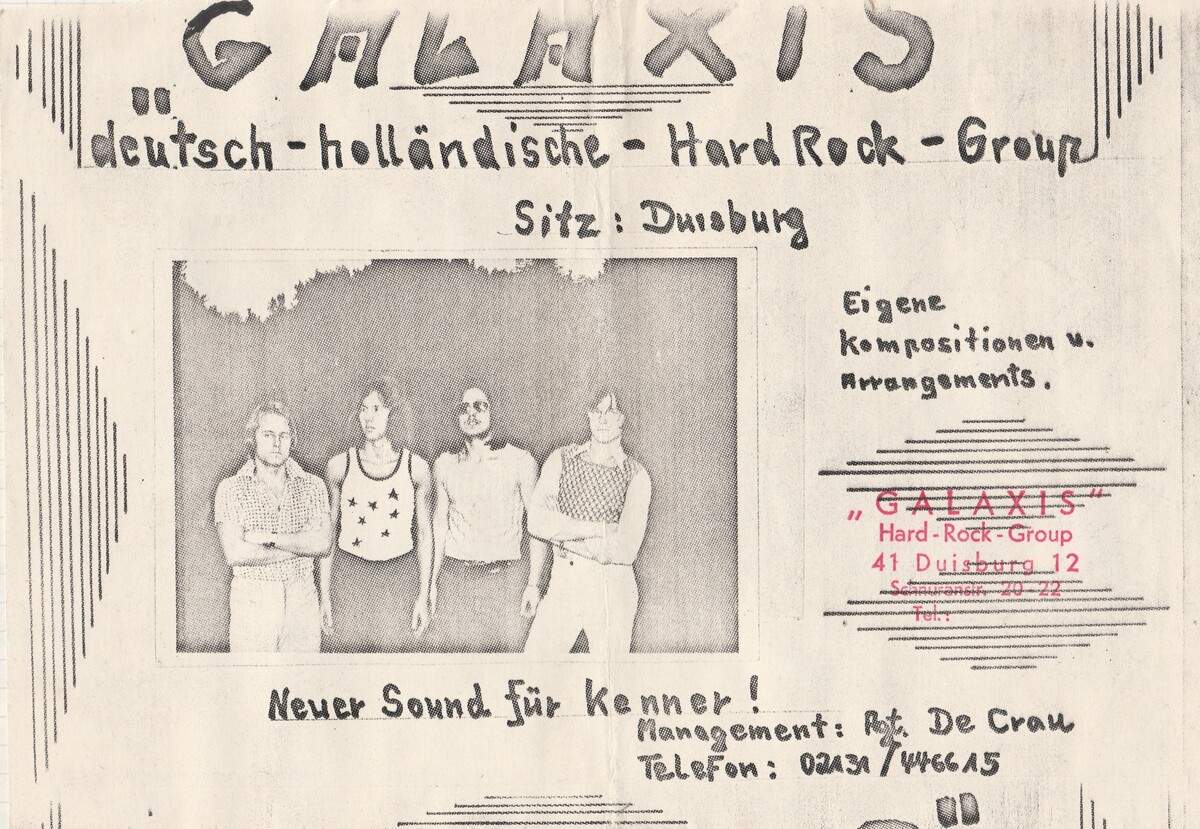
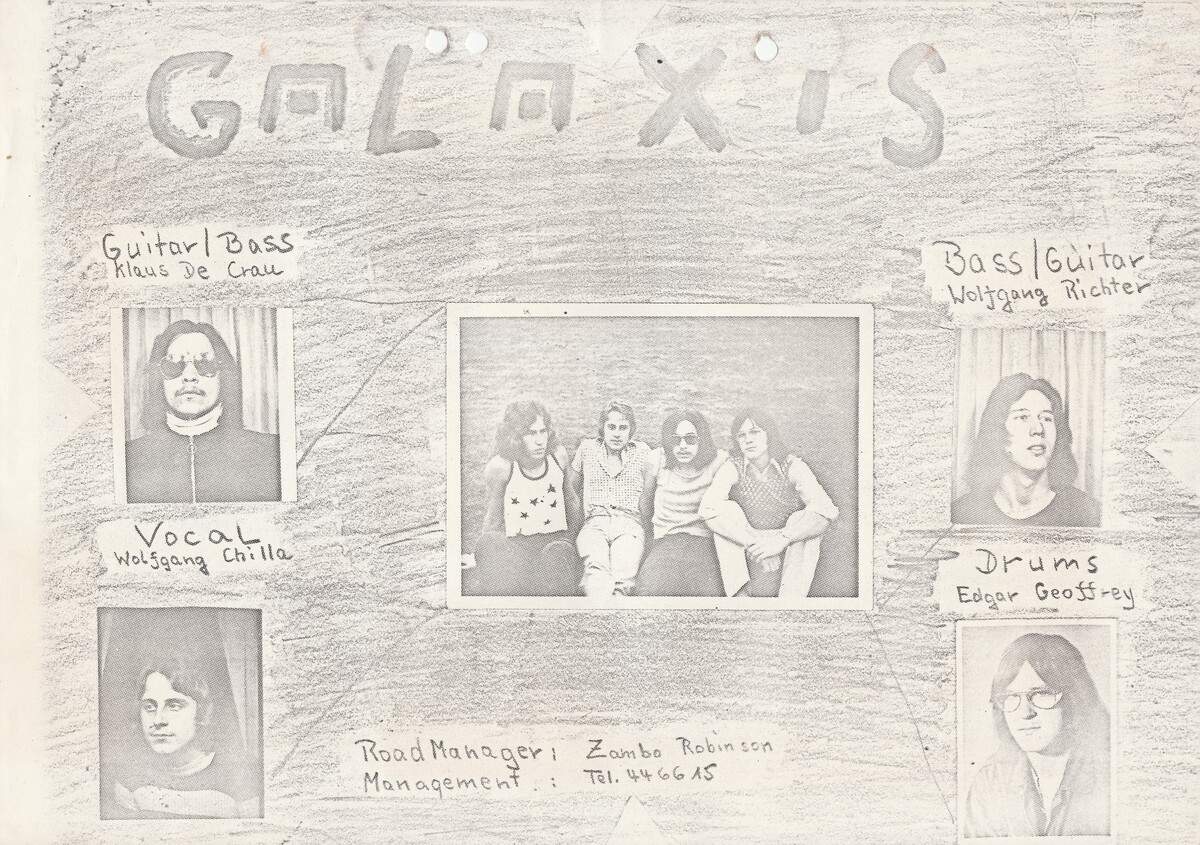
When did you eventually stop playing together?
Life often has other plans. Our bass guitarist met his future wife on the Majorca tour and drove back to Germany with her straight from Majorca, starting a new life in southern Germany. In the first few weeks after his return, he still came to the weekly Friday rehearsals. But in the long run, traveling back and forth was too strenuous. Then we also lost the rehearsal room, which was demolished to build a house on the site. With that, Galaxis became history, which we now hope will be relived!
Was there a plan to release an album back then?
No, we couldn’t have done it ourselves. At the time, a publisher offered us a record deal, but when we looked through it, we felt it was an adhesion contract that would have attributed all possibilities to the publisher, and we would only have been the recipients of orders. We didn’t want that.
What would be the craziest gig you ever did?
Predominantly the open-air concert with UFO, which was immediately followed by the trip to the Spanish island of Majorca and which is still remembered there to this day. But we also remember a performance in the local discotheque “Tabaris” as a crazy concert evening, when our singer Wolfgang Chilla didn’t turn up on the night, and Ewald drove to his house to see where he was. He found Wolfgang in the bathtub, where he had made himself comfortable and then forgotten the time. We were able to calm the host with the excuse that Wolfgang was involved in a car accident through no fault of his own but was uninjured and had to wait for the police investigation. With a delay of about an hour, we were finally able to start the concert, and in the end, our music made the guests forget the long wait.
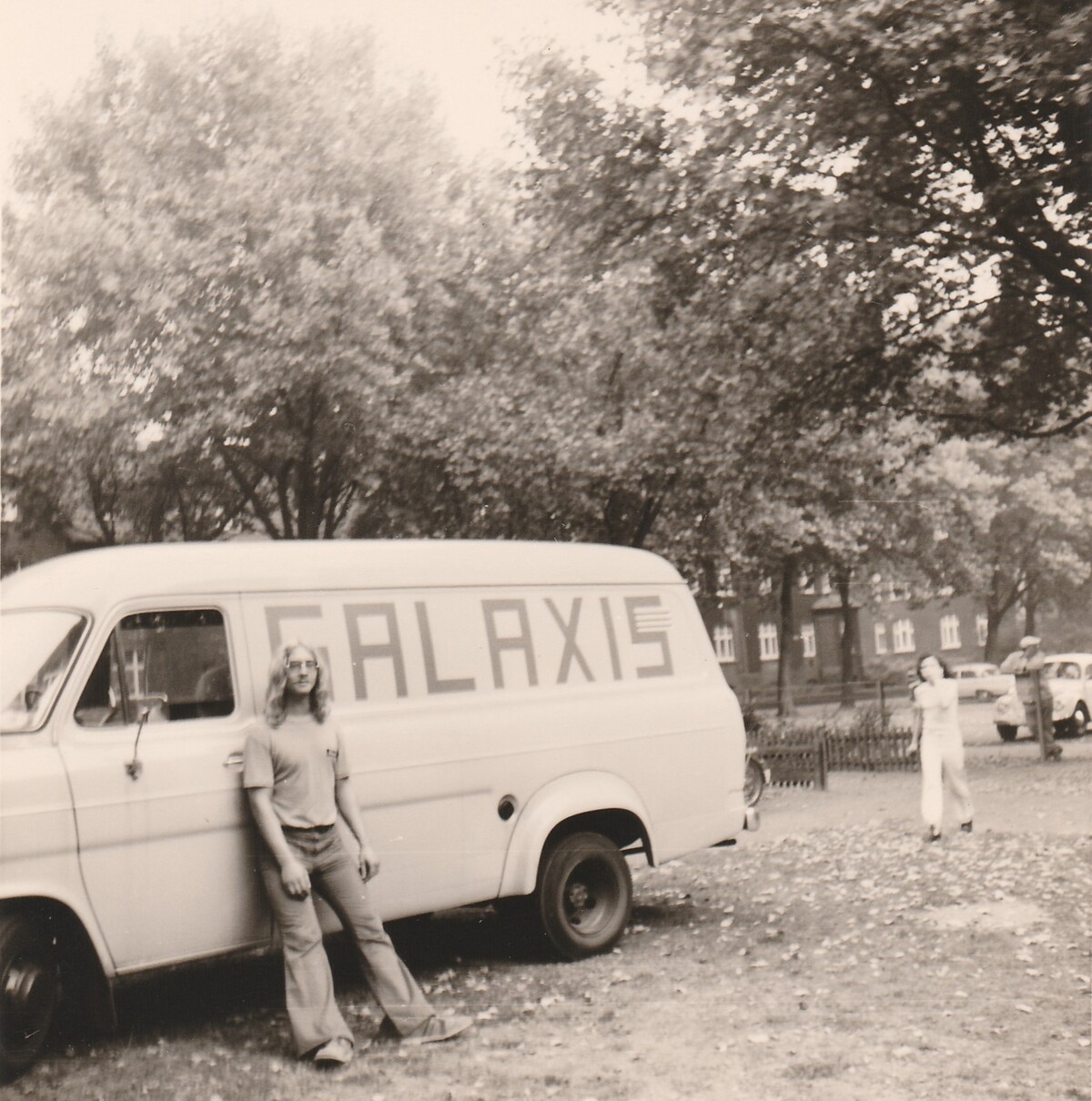
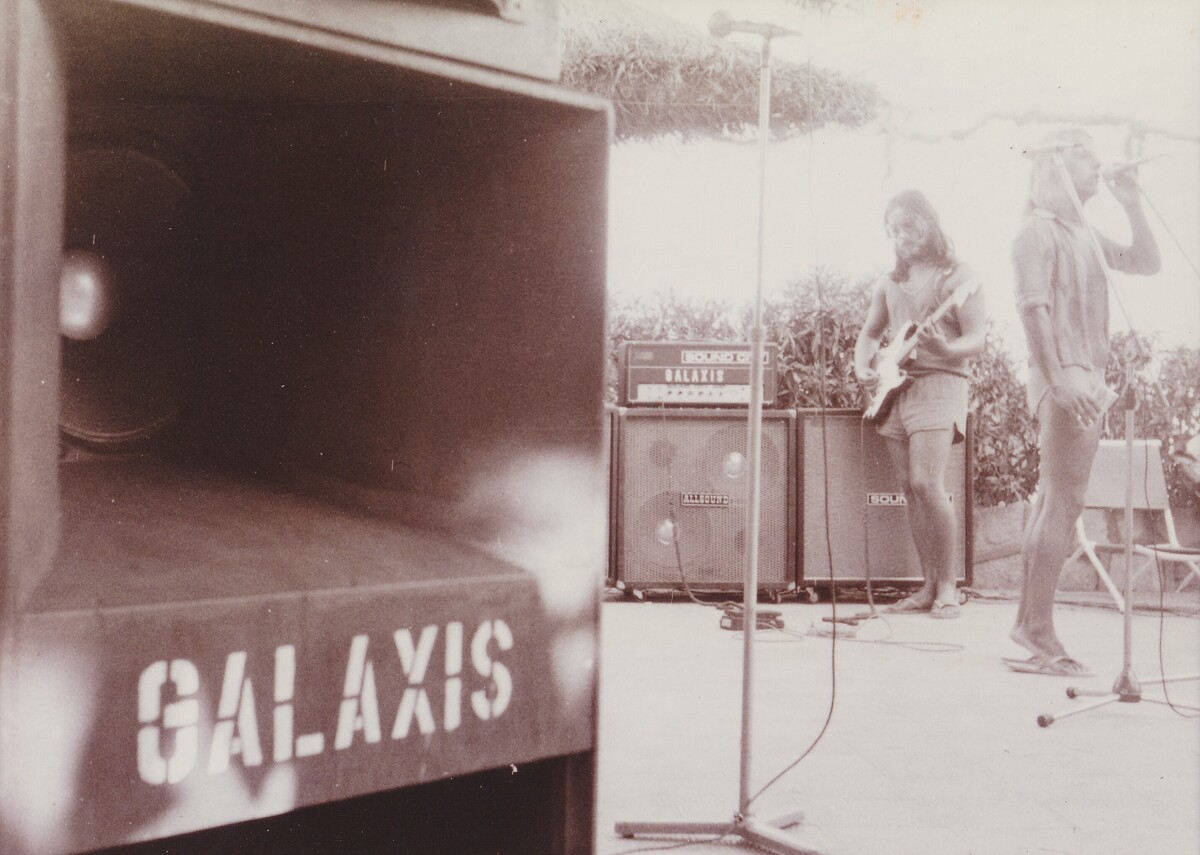
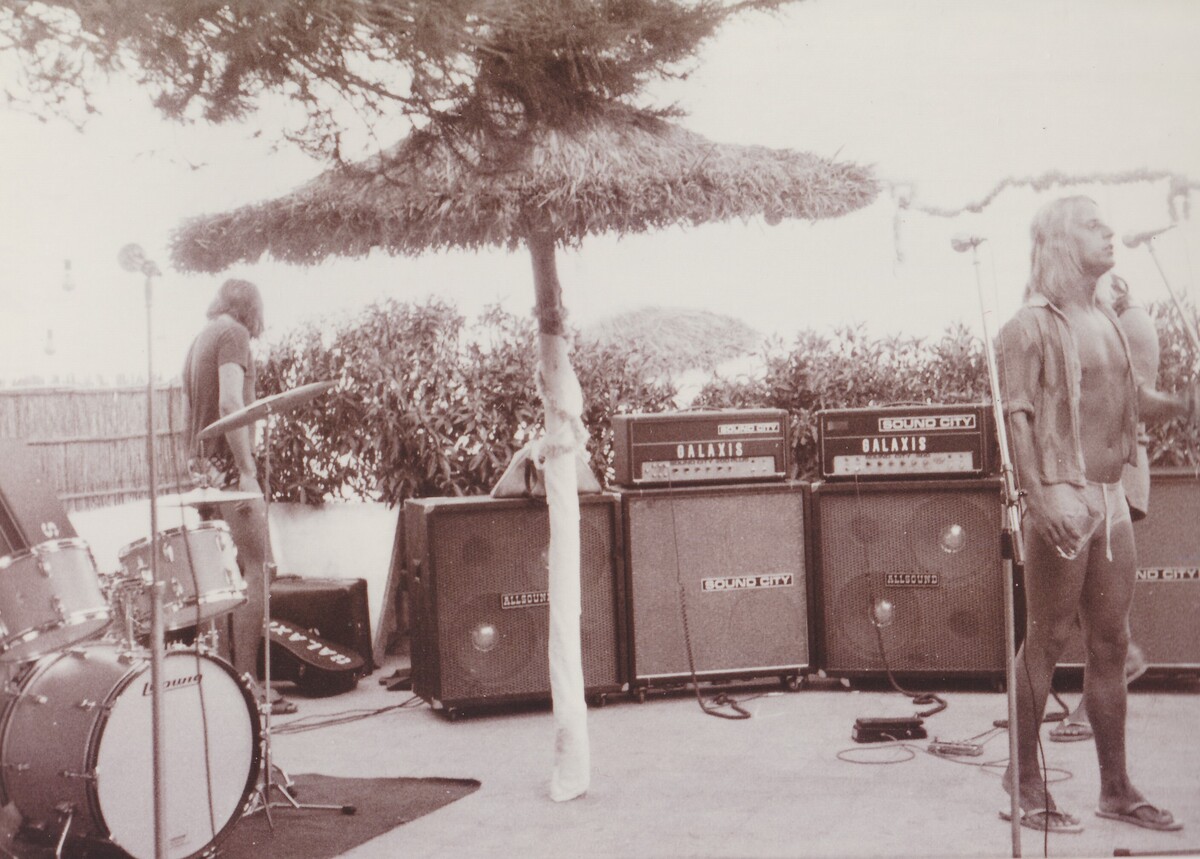
Did any member participate in any other bands back then? Or later in the 70s?
Parallel to Galaxis, none of us played in other bands. That only changed after Galaxis disbanded.
What occupied your life later on?
Primarily, our lives were determined by starting families and working in civil professions. But music continues to be a companion throughout our lives. Wolfgang Richter eagerly carried on making music with his sons, and the younger one is now a professional musician, known under the name Mick Richter. Only Edgar Geffroy stopped making music as an active drummer and started his professional career, among other things, as a successful author of business books but also in light literature. He has become one of the leading experts in Germany in the development of future strategies in the business sector and has worked with many large and well-known brands. After Galaxis, Ewald worked with the bands “Bernstein” and “Linn,” which our Galaxis singer Wolfgang Chilla later joined. After that, he was active for a short time in the Irish folk band “Sheevón” (co-founded by our guitarist Claus), which also changed his musical genre. Wolfgang Chilla was also active in the Duisburg band “Alma Ata” and sang in the choir of the Stadtwerke Duisburg. Now he is active in the cover band “Hard Thing” and an unplugged ensemble. Ewald later also discovered choral music and piano for himself and is immersed in that with many concerts in renowned choirs throughout Germany. In short, we have all remained connected to art in its diversity, each in his own way.
Did you stay in touch with members all these years?
Over the years, Claus and Ewald still had occasional encounters through family ties and through their bond with Sheevón. Otherwise, contacts were rare or by chance.
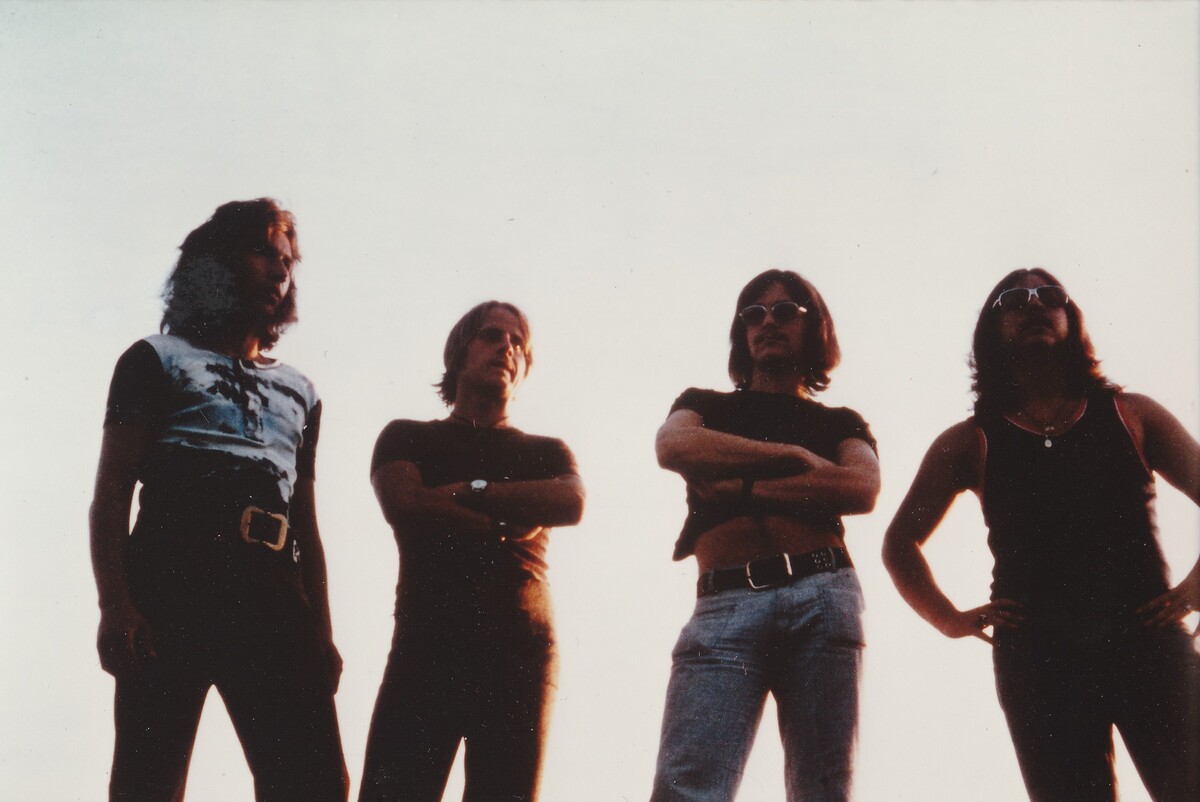
What are some of your favorite memories from Galaxis and the 60s/70s in general?
Our fondest memories are that we were a close-knit team; we bonded with real friendship, and we could not imagine a time without the other guys. We consider the 60s and 70s to be the best time one could have had as a young person. Without the influence of today’s social media tools, the physical contact with people of the same age was very intense, and the music was incredibly emotional and touching at the time.
What currently occupies your life?
Clearly, family comes first, but also music.
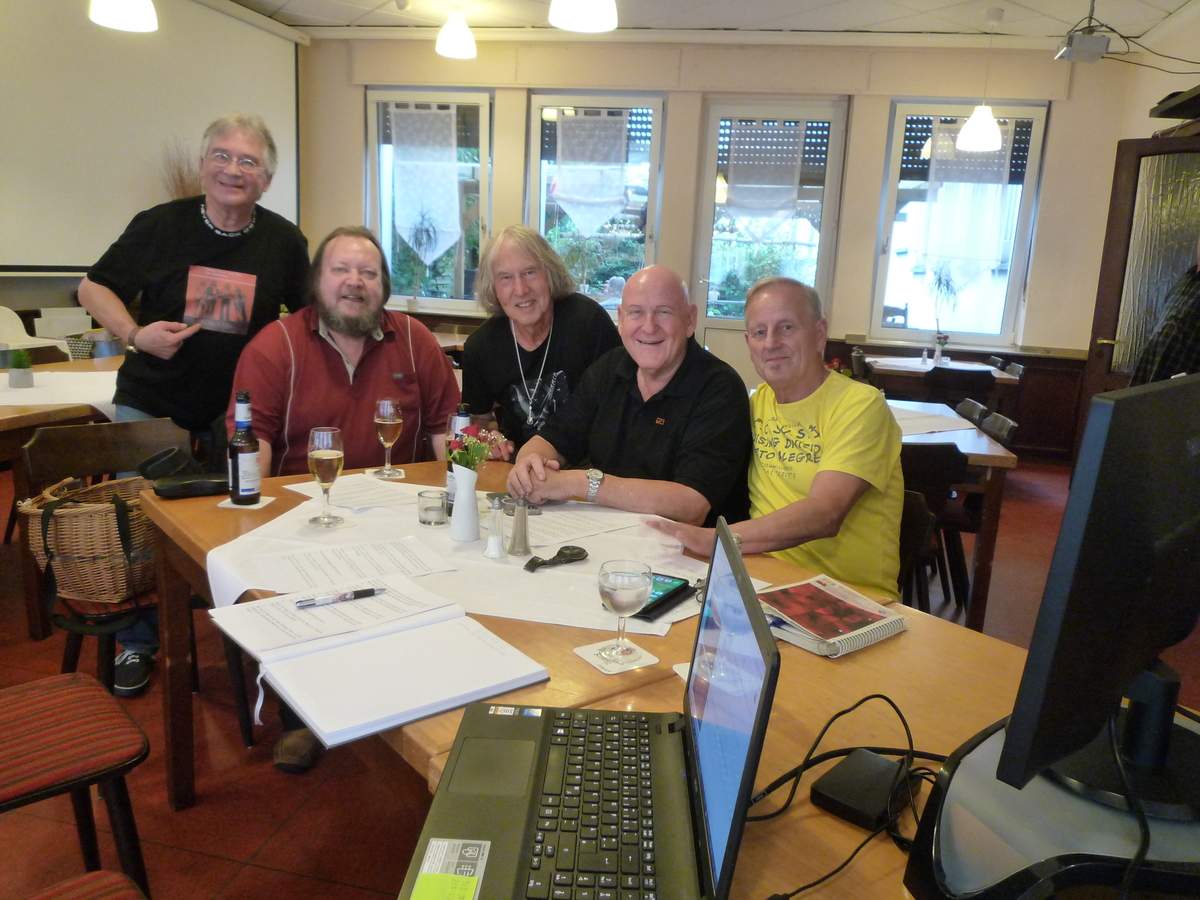
Thank you for taking your time. The last word is yours.
We are extremely grateful to Adam Bennati for bringing us together again, and we hope to see each other more often from now on. Our wish is that with the rebirth of the group Galaxis within this new project, many new followers will be gained and inspired by music from the early 70s.
Klemen Breznikar
Galaxis Instagram
Ancient Grease Records Official Website / Facebook / Instagram
Headline photo: Galaxis at Cala Figuera, Mallorca

